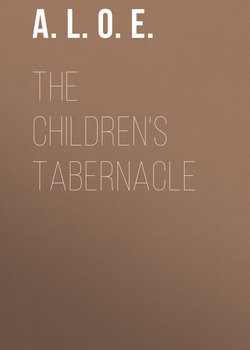Читать книгу The Children's Tabernacle - A. L. O. E. - Страница 7
VI.
Types
Оглавление“This is the day when Christ arose,
So early from the dead;
And shall I still my eyelids close
And waste my hours in bed!
“This is the day when Jesus broke
The chains of death and hell;
And shall I still wear Satan’s yoke
And love my sins so well!”
THIS well-known hymn was on Amy’s mind when she awoke on the following day, and it rose from her heart like the sweet incense burnt every morning in the Tabernacle of Israel. But Dora’s thoughts on waking, and for some time afterwards, might be summed up in the words – “Oh, I wish that this day were not Sunday! How tiresome it is, when my beautiful pattern is all ready, not to be able to try it!”
Mrs. Temple did not appear to be much the worse for her shopping in the rain. Her children knew nothing of the aching in her limbs and the pain in her face which she felt, as she bore both quietly and went about her duties as usual. Dora did not trouble herself even to ask if her mother were well. It was not that Dora did not love her kind parent, but at that time the mind of the little girl was completely taken up by her embroidery in scarlet, purple, and blue.
As the children might not go to church, Mrs. Temple read and prayed with them at home, suffering none but Lucius to help her, and letting him read but little, for fear of bringing back his cough.
All through the time of prayers, though Dora knelt like the rest of the children, and was as quiet and looked almost as attentive as any, her needlework was running in her mind. If she thought of the happy cherubim, it was not of their crying “Holy, holy, holy!” in heaven, but of the forms of their faces and wings, and how she could best imitate such with her needle.
I will not say that the other children thought about the Tabernacle only as a holy thing described in the Bible, from which religious lessons could be learnt, – little plans for sewing, measuring, or making the model would sometimes intrude, even at prayer-time; but Lucius had resolutely locked up his knife, and he and three of his sisters at least tried to give full attention to what their mother was speaking when she read and explained the Word of God.
Mrs. Temple purposely chose the ninth chapter of the Epistle to the Hebrews, a very difficult chapter to the young, but one likely specially to interest her family at a time when the subject of the Tabernacle in the wilderness was uppermost in the minds of all. It will be noticed that Dora did not join at all in the conversation which followed the reading.
“Mamma, that chapter comes nearly at the end of the Bible, and is about our Lord and his death,” observed Lucius; “and yet it tells us about the Tabernacle, and its ark, and the high priest going into the Holy of holies. Now, what could the Tabernacle in the desert have do with our Lord and His dying, – that Tabernacle which was made nearly fifteen hundred years before the birth of Christ, and which was no longer of any use after Solomon’s temple was built?”
“The Tabernacle, the ark, the high priest, the sacrifices were all TYPES or figures of greater things to come,” replied Mrs. Temple. “There was a secret meaning in them all, referring to our Lord, His work, and His death, and the glorious heaven which He was to open to all believers.”
“I don’t know what a type is,” said Elsie.
“It is not clear to me either,” observed Amy.
“Unless we quite understand what a type means, we shall lose much of the lesson conveyed by the wanderings of the children of Israel, and the long account of the Tabernacle, what was in it, and what was done there, which we find in the books of Moses,” remarked Mrs. Temple.
